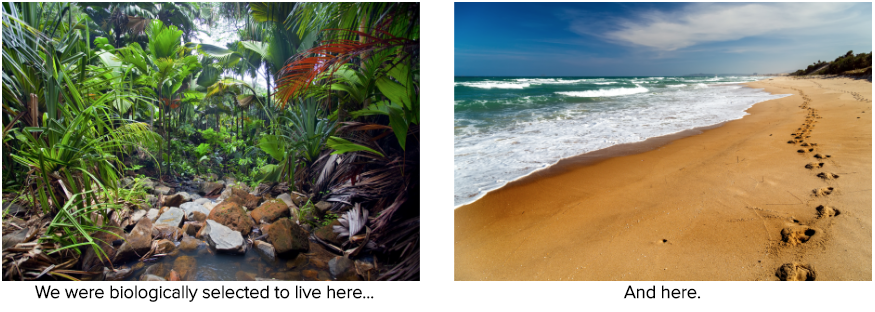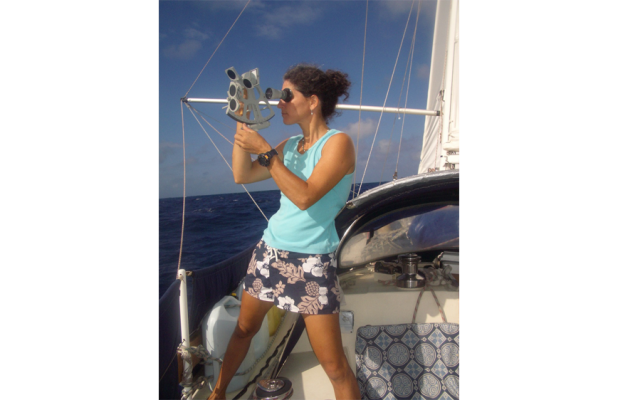I welcomed a friend to our café the other day, and as she was shrugging off her coat she grumbled, “I had such a tough time getting here today; it took me way longer than usual.” I responded, “Ouch, I am sorry to hear that; did you have a lot of traffic on I-95?” She said, “No, it wasn’t on I-95, but after I got off 95 that Google maps made me do 2 U-turns, which wasted so much time… it was just terrible.” I said, “Oh, you must have wanted to come a new way, I mean, you’ve been here so many times before, you don’t need to use Google Maps?” (naïvely still trying to empathize). She said, “Pete, are you kidding? I don’t go anywhere without Google giving me directions.”
What? This is a forty-something professional, with twenty years of experience in her domain, and at least two expensive graduate degrees from elite universities. What went wrong? When did we turn our backs on our tradition of strength and intelligence, and allow ourselves to become so helpless? By blindly “following” technology, (in this case Google maps) at best, haven’t we given up our autonomy, our self-will, our consciousness to the coders at Google?
Worse, have we become a victim / puppet on the end of a string, if the coders at Google deliberately took us on those two U-turns to go by the Wal-Mart twice (because they knew from following every single keystroke of your Gmail, that’s where you shopped on-line earlier in the day)? Naturally, luring you there means they will charge Wal-Mart more for advertising. Think that’s crazy talk? Answer me this: Who is Google’s customer…who’s paying them, You or Wal-Mart?
I was in the car of a friend recently, when he took a call from his 20-year-old son, Tom, a third-year Ivy League college student. Evidently, Tom had a flat tire in the Mid-Atlantic town where the school is located. He was calling Dad, as he needed help in a payment method for a tow truck to get his car to a service station, to have his flat tire changed. I wasn’t focusing on the call, so when Dad got off the phone I asked, “Hey is there a special problem, why doesn’t Tom just change the tire there on the road? Too bad he has to wait for the tow truck, doesn’t he have a spare?” Dad looked at me with a mixture of pity and disgust. “Tom can’t do that, how would he know how to change a tire?”
The big idea of the Industrial Revolution was division of labor—specialization. Industrialization fostered specialization—and it resulted in fantastic gains in productivity. Trained professionals are mostly better than self-taught amateurs, and their expertise allows them to develop better tools for their crafts—tools that only they know how to operate. Then, over time, a subtle cancer spread: where you have more experts, you create more bystanders. Professionals now do our fighting, our navigating, our fixing, and most of the helping, that we used to handle ourselves. They have even taken over our fun, playing our sports while we sit on the couch, reach for the Cheetos, and watch…as spectators: Bystanders.
You don’t have to be a biologist to see that many abilities our species has been pushing to the side many of our unique abilities, in the interest of comfort zone. Which abilities we will soon lose. Need evidence? How about just navigating our world? Researchers hooked up London cab drivers to MRIs, and discovered the longer they drove cabs (and navigated London from their memory), the more their hippocampus increased. Thinking spatially, drastically increased the volume of the brain. More interesting, once drivers retired and stopped using their unique ability, their brain structures receded to average. The Scientific American article on the study is here: https://www.scientificamerican.com/article/london-taxi-memory/.

Are the things we created to keep us comfortable making us weak? Every human alive today in the developed world lives in a cocoon of comfortable, environmental consistency…an eternal summer. We are overlit, overfed, overstimulated, and—in terms of how long we’ve been on earth— that’s all new. At the present moment, our technology is changing at an exponential rate. Since human, Darwinian, biological selection proceeds at an inexorably slow linear rate, the pace of cultural change is too rapid, and we begin to suffer the evolutionary mismatches between our hunter-gatherer biology, and the world we have invented.
Evolution molded our minds and bodies to the life of hunter-gatherers. The transition, first to the Agricultural Age, and then, only 150 years ago, to the Industrial Age, has condemned us to living unnatural lives, that do not give full expression to our inherent inclinations and instincts, and therefore cannot satisfy our deepest yearnings. Nothing in our “comfortable” lives will approach the wild excitement and sheer joy, experienced by a band of hunter-gatherers on a successful hunt.
In our hunter-gatherer past, we were biologically selected in environments where there were always physical challenges to overcome; those challenges were part of what made us human in the first place. Despite all our technology, our bodies are not ready for a world completely tamed by our desire for comfort. Without the stimulation of adversity or dis-comfort, the brilliant responses that were designed to overcome environmental challenges lie dormant. The goal of civilization seems to be to eliminate work and risk, but the world leveraged by technology has changed exponentially—more than we have. Our bodies crave work and sex; our minds crave risk and conflict.

Why surrender your free will, your uniquely human consciousness to Google maps (or to any other artificial device)? You are walking away from your particular human-ness, slipping into the abyss, where using certain technology makes you temporarily feel more comfortable—and makes you weak. Call it what you want: willpower, focus, free will, concentration, consciousness, Phi. It seems like a small thing, but it’s a window to the root of our uniquely human intellectual power, and not only that, a place that if exercised, will unlock the physical body’s hidden biology.
Need more evidence? The “World Value Survey 2017” is a longitudinal study carrying out surveys across the globe since the 1980’s. Based on this research, Inglehart, Welzel, and Foa, looked at the changes of both happiness and self-assessed freedom of choice. The strong correlation between changes in subjective well-being, and sense of free choice could not be more clear. https://ourworldindata.org/happiness-and-life-satisfaction/.
Get it? The more we give up our animal spirits…our physical ability, by deferring to comfort and technology, the less human we are; the less happy we become. Getting out of our comfort zone, and acting like our ancestors had to every day, empowers us to become more human (again). Technology has the ability to enhance and extend our intelligence, not get in the way of who we really are, or who we can really become. Otherwise, as my friend Barb says, if you play dead, you are dead.
We live in the most extraordinary time in the history of the world. As entrepreneurs and creative game changers, we have big goals, and for us, to strive for unlimited learning and growing is normal. How will we unlock our dreams, our potential strengths, the vital spark, the source of our light… if we mindlessly give away our consciousness to technology, in the pursuit of comfort?
Of Note: References and Further Reading:
- Carney, S. (2017). What doesn’t kill us: how freezing water, extreme altitude and environmental conditioning will renew our lost evolutionary strength. New York: Rodale.
- Eagleman, D. (2012). Incognito the secret lives of the brain. New York: Vintage Books.
- Ferriss, T. (2016). Tools of Titans: The Tactics, Routines, and Habits of Billionaires, Icons, and World-class Performers (Pps. 92-99 Laird, Hamilron, Gabby Reece, and Brian MacKenzie). Houghton Mifflin Harcourt.
- Harari, Y. N. (2017). Homo deus: a brief history of tomorrow. New York, NY: Harper, an imprint of HarperCollins.
- Max Roser (2017) – ‘Happiness and Life Satisfaction’. Published online at OurWorldInData.org. Retrieved from: https://ourworldindata.org/happiness-and-life-satisfaction/
- Hof, W. (n.d.). Wim Hof Method – Join Our New Platform. Retrieved March 27, 2017, from https://www.wimhofmethod.com/pages/practice-the-method
- Jabr, F. (2011, December 07). Cache Cab: Taxi Drivers’ Brains Grow to Navigate London’s Streets. Retrieved March 27, 2017, from https://www.scientificamerican.com/article/london-taxi-memory/.
- Kolter, S., & Wheal, J. (2017). Stealing Fire How Silicon Valley, the Navy Seals, and Maverick Scientists Are Revolutionizing the Way We Live and Work. Dey Street Books.
- McDougall, C. (2016). Natural born heroes: mastering the lost secrets of strength and endurance. New York: Vintage Books, a division of Penguin Random House LLC.
© 2024 Bigelow LLC. All rights reserved.

